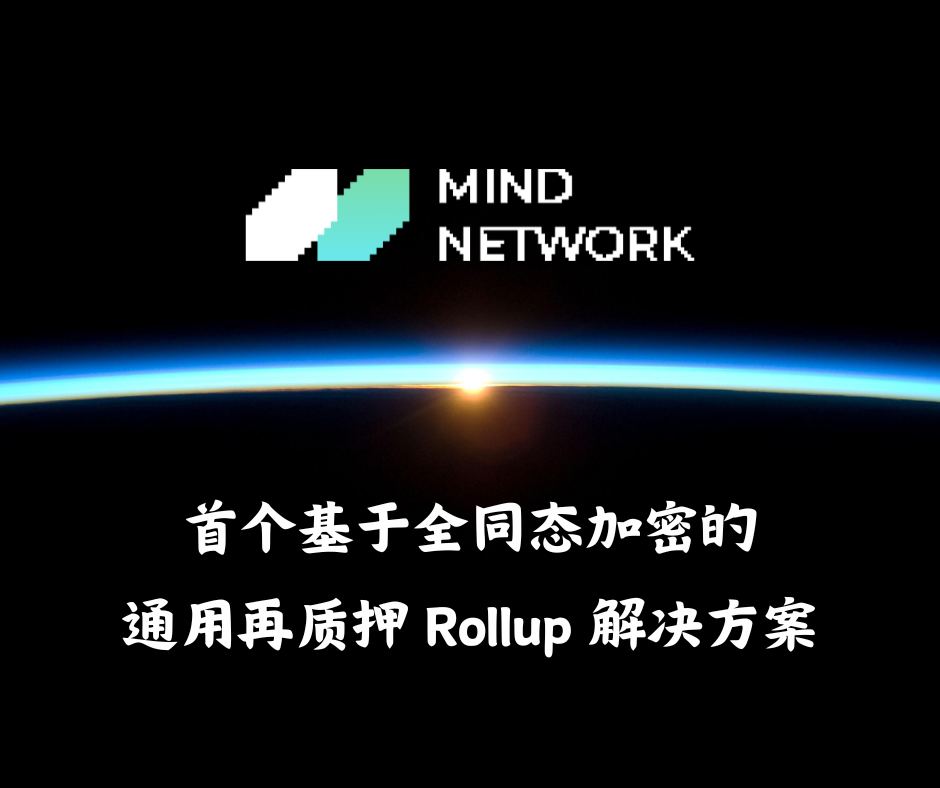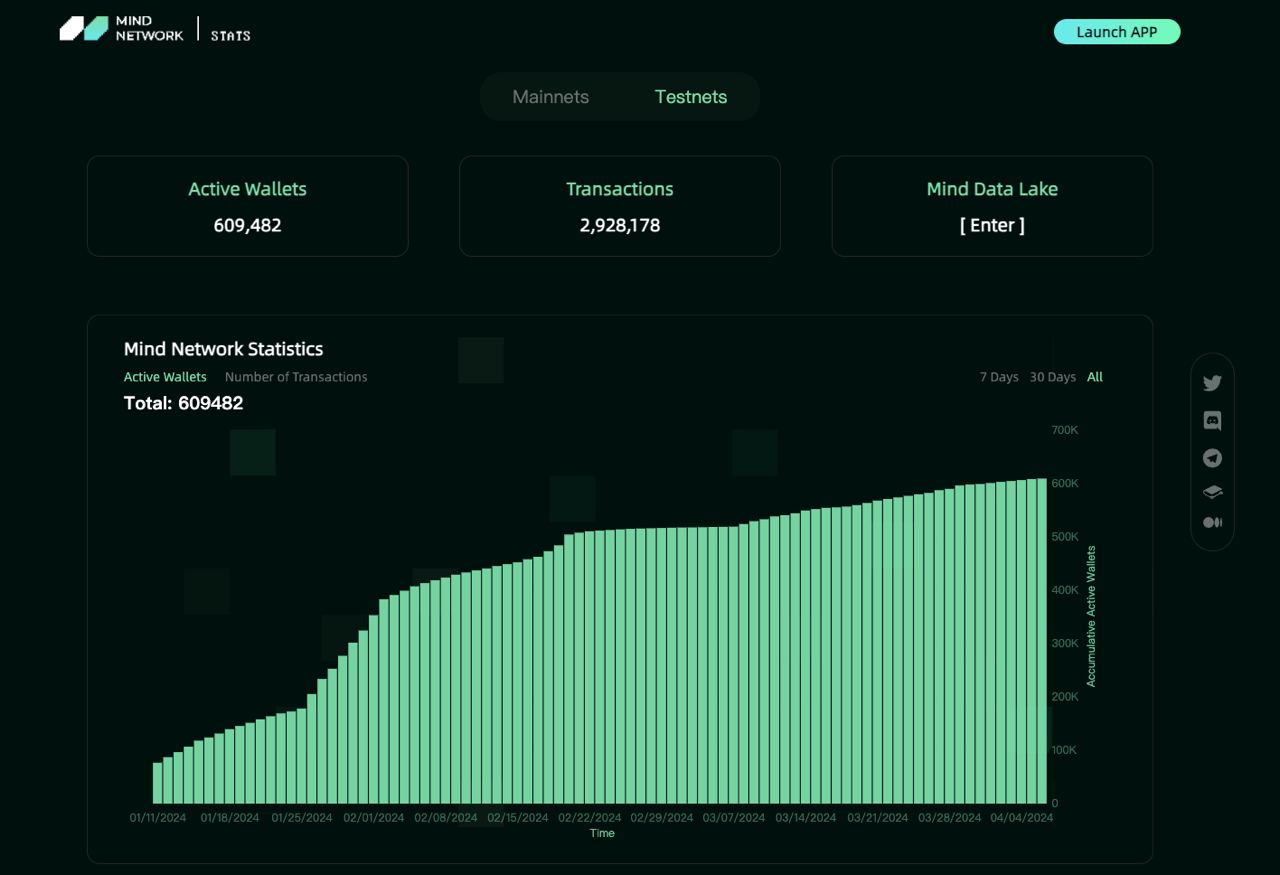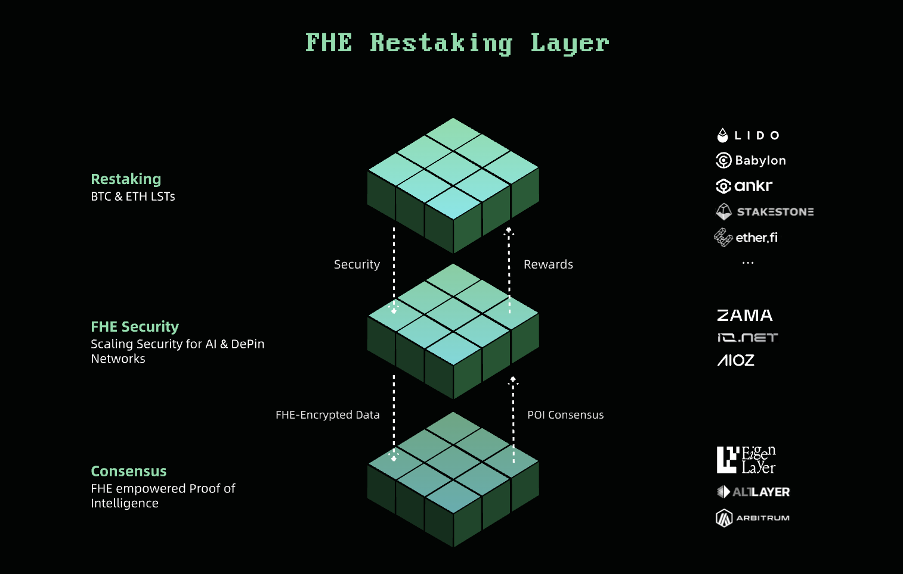Original|Odaily
Author|jk

1. Project introduction:
Mind NetworkIt is the first universal re-pledge rollup solution based on fully homomorphic encryption (FHE), bringing secure computing and consensus to EigenLayer and the Ethereum ecosystem.Mind Networks solutions enable verifiable decentralized computation on encrypted data, solving challenges in real-world use cases such as decentralized GPU networks for AI work and decentralized physical infrastructure networks for managing sensitive user data ( DePIN) etc. Mind Networks solutions have reached product market consensus with projects such as io.net, AIOZ, Nimble Network (AI), and Chainlink.
2. Project Milestones
Mind Network has received investment from Binance Labs, Hashkey, Big Brain, Chainlink, Comma 3, SevenX, and received funding from the Ethereum Foundation to study the practical application of FHE technology on Ethereum
Mind Network is incubated by Binance Incubation Camp
Mind Network participates in Chainlink BUILD program
Cooperate with industry leaders such as ZAMA, Chainlink, etc. to become business partners
testnetWithin 3 months of release, there were more than 600,000 active wallets and nearly 3 million transactions. TestnetOdyssey activitiesEnding soon
Over 800,000 social media followers and community members
The mainnet will be launched in early May

3. The trend of re-pledge technology and its challenges
Re-staking technology leverages Ethereum’s consensus layer to extend cryptoeconomic security to other applications on the network. Ethereum is the most secure PoS chain in the world, with a TVL of $50 billion, but the average staking yield is about 4%. With Bitcoins current market cap at $1.4 trillion, its clear that staking is not an option. Projects like Babylon are using self-custody and locking Bitcoin to secure the PoS chain.
At present, more and more projects on the market are launching re-pledge, which can obtain more benefits and project points on the basic interest rate. Multiple layers of superimposed benefits allow users to participate more actively, bringing re-pledge to an unprecedented level. The trend is one of the wealth codes of the most popular track in these two months.
However, re-pledge faces many challenges:
Centralization risk: A major concern is that restaking could lead to centralization of staking, with a small number of validators cheating and controlling staking, which could lead to reduced neutrality.
Compound risk: LST from one ecosystem (such as ETH) may be damaged and amplify the compound risk, making it a systemic risk to the ecosystem.
Data security: The operator is not equipped with a data protection mechanism, which may affect data privacy and computational fairness. This is crucial for data-intensive networks like AI or DePIN networks.
4. Mind Network Solutions
4.1 FHE - The Holy Grail of cryptography
Fully Homomorphic Encryption (FHE) is a technology that allows computation on encrypted data. Recent advances have increased the speed of FHE solutions by 20x, and will soon reach 100x, which will also help drive significant progress in blockchain and artificial intelligence. It is now possible to convert an AI model into an FHE equivalent and perform training and inference on encrypted data. Data scientists can already start building simple confidential AI applications now, and in the near future as hardware acceleration becomes available, integrate more complex models such as large language models (LLMs). FHE, the holy grail of cryptography, will soon enable end-to-end encryption for the entire Internet via a new, FHE-powered HTTPZ protocol.
4.2 FHE re-pledge layer

Mind’s FHE re-staking solution consists of three interconnected layers:
Re-pledge layer: Supports re-pledge tokens of various security preferences. Cooperating with industry leading projects such as EigenLayer, StakeStone, Renzo, Babylon, Ankr, etc., Mind Network uses re-pledge tokens to bring funds from first-class networks such as Ethereum and Bitcoin to Safety brought to users. Mind Network works with strategic partners such as Chainlink CCIP and Connext to provide remote re-staking across different networks. Popular productsMindSAP(FHE + Stealth Address) is natively supported to protect the privacy and security of on-chain and cross-chain transactions.
FHE Security Layer: Mind Network believes that the path to ensuring ownership in Web3 is end-to-end encryption, which is especially critical for data-intensive networks like AI or DePIN networks. The draft introduces enhanced FHE verifiers to ensure end-to-end encryption of the verification and consensus calculation process. This computation is fully decentralized, and owners of FHE validators can choose to join different networks and receive rewards. Security will be further enhanced through integration with modular fhEVM partners Fhenix and Inco.
Consensus layer: Mind Network introduces a novel Proof of Intelligence (POI) consensus mechanism specifically designed for AI tasks to ensure fair and secure distribution of rewards among FHE validators, providing a powerful framework for behavior within the network. To perform safely and transparently. In addition, Mind Network is collaborating with AltLayer, EigenDA and Arbitrum Orbit to launch a rollup chain to further improve the cost efficiency and performance speed of consensus calculations.
The above solutions not only bring substantial improvements in security, but also cover the most popular re-staking projects. The last test network activity stage before the main network launch has already gained popularity. Under the stimulation of multiple rewards, the main network is expected to be launched. It will bring a bigger wave of attention later.
4.3 Mind Network: Intelligent Proof
Unlike Proof of Work (PoW) and Proof of Stake (PoS), which rely on solving complex mathematical problems or holding a certain number of tokens, Proof of Intelligence (PoI) harnesses the power of machine learning (ML) tasks. In other words, nodes in the AI network are rewarded by performing ML tasks rather than traditional methods.
However, in order to protect the results of machine learning tasks and mitigate potential threats from malicious FHE validators, Mind Network proposes to calculate rewards and reach consensus based on FHE encrypted data. By leveraging FHE, sensitive data remains encrypted throughout the entire process, ensuring confidentiality and integrity.
In Mind Network, three clusters coordinate the work of validators: mining cluster, validator cluster, and consensus cluster. Mining clusters play a key role in model generation, while validators evaluate the accuracy of these models. These clusters, namely miners and validators, form the fundamental building blocks of the subnet and together drive the functionality of the network. Instead, the consensus cluster is responsible for reaching consensus among diverse validators, ensuring consistency in key decisions within the network, and calculating rewards allocated to Mind subnet participants. Together, these clusters form the backbone of Mind’s verification services, strengthening the network’s infrastructure and promoting its operational efficiency.
4.4 Re-staking x AI
Re-staking leverages Ethereum’s consensus layer to extend cryptoeconomic security to additional applications on the network. Ethereum is the most secure PoS chain in the world, with a total locked value of $50 billion. But the average staking yield is about 4%. With Bitcoins current market cap at $1.4 trillion, staking is clearly not an option. Projects like Babylon are using a self-custody approach and locking Bitcoin to secure the proof-of-stake chain. Mind Network introduced the FHE re-hypothecation layer to bridge the market capitalization gap.
AI projects and systems are growing exponentially, with AI computing needs doubling every 3.5 months. However, it faces the challenge of highly concentrated GPU resources and governance models to develop major AI development, such as model training and inference services. This means that the industry is already facing a bottleneck, not only due to huge overhead costs, but also ethical and privacy issues.Mind Network is ready for AI use cases on the blockchain, providing the following four contributions:
Contribution 0: The security of the crypto-economy is crucial, especially for AI networks that are just starting out. Mind Network introduces diversified restaking tokens to eliminate compounding risks from a single ecosystem.
Contribution 1: Mind Network believes that the demand and potential of the AI network is huge and will allow re-staking token holders to share in the upside of bullish AI tokens while minimizing the risk of volatility.
Contribution 2: AI models require a large number of parameters to update collaboratively. Mind Network introduces a new AI-native rollup with faster computing speed and lower cost, as well as an innovative intelligent proof consensus mechanism designed for AI networks.
Contribution 3: If the AI parameters are completely plain text data and every operator can see it. It can easily be copied from one another, leading to manipulation. Protected by FHE, Mind Network enables anonymous scoring and voting to keep the AI secret but publicly verifiable.
5. Mind Network Team
The co-founder team are serial entrepreneurs of the Web3 project and Ethereum Foundation researchers
Top Cryptozoology PhDs, Researchers and Academic Laureates
Team members come from first-tier companies and universities such as Microsoft, Google, McKinsey, and Cambridge University


